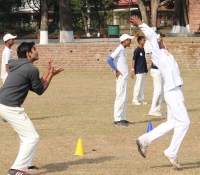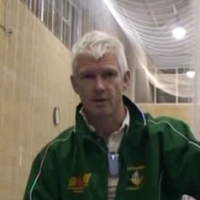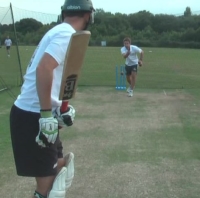How an International Cricketer Used a Simple Trick to Instantly Boost His Batting Average

I'm working this week with an incredible tutor group on the ECB Level IV Batting module at the National Cricket Performance Centre. Matthew Maynard, Tony Middleton (the Hampshire CCC Batting coach) and myself are heading up the course.
"You'll be a Lesser Coach if You Don't Have Technology", Toby Radford Reveals
 There's no doubt that technology is transforming the way we prepare as cricketers. Analysis tools have never been easier or cheaper so even club players can get in on the game.
There's no doubt that technology is transforming the way we prepare as cricketers. Analysis tools have never been easier or cheaper so even club players can get in on the game.
When I interviewed Glamorgan Coach Toby Radford, I asked him about how he uses technology to help him coach, and his answer was emphatic:
Are You Damaging Batsmen with "6 Balls Left"? You'll Enjoy This Solution

Have you ever said to a batter "you have 6 balls left!", then they change their mode and just slog?
The damage that this does is immeasurable.
Any progress from the session is diluted or reduced. The batting shapes and thought processes evaporate.
Arguments ensue about whether it was 4, 6 or caught at deep mid on
The batter starts the next opportunity to bat with this poor experience running through their veins.
It's one of my biggest bug bears, and for years I have been trying to figure out a way around this.
Here's a Creative Way to Get More Young Cricketers
 Does your team need more young cricketers?
Does your team need more young cricketers?
Many clubs are feeling the pinch these days. Kids have more choice of activity than ever, which is making the pool smaller every year. It's tough to compete with football, PlayStation and iPads.
You can't sit back and wait for a new intake of 11 year old players to arrive. You have to start early and make cricket as entertaining as all the other distractions. That's why it's time to rethink how to bring youngsters into the game.
Are You Ready to Bat: How to Deal with Anxiety at the Crease

How many times have we walked back to the pavilion asking "what on earth happened there?"
I know I have on numerous occasions.
As you read last week, England and Somerset batsman Nick Compton popped in to run a Batting Masterclass at Millfield School.
7 Stages of Improving Batting Technique
 Gary Palmer is a batting coach and former-first class cricketer. You can find out more about Gary's coaching guides here. In this article he talks about the process of developing batting technique. Essential reading for all coaches.
Gary Palmer is a batting coach and former-first class cricketer. You can find out more about Gary's coaching guides here. In this article he talks about the process of developing batting technique. Essential reading for all coaches.
Technique is the key.
Correcting batting technique is still the best way to improve your batting. An excellent technique gives you the tools you need to score huge numbers of runs in the summer. The best coaches teach the basics to the highest levels as they are the foundations of long term development.
Use This Simple 3 Stage Drill to Improve Batting Decision Making

Last week I talked about the missing two thirds of batting and focused on helping batters pick up visual cues. The next phase of the batting process is to build up our decision making capacity.
One of the ways that works for me is to build up the number of resources available to the individual: That is to say which options can be used.
I then to test which ones are most effective in a variety of scenarios and match conditions. This way, the player starts to decide for themselves.
I ran a session based on this today around playing spin using the Merlyn spin bowling machine variation mode which subtly shifts lengths by 10% either way.
The session went a little bit like this:
Could This Innovation in Nets Improve Your Team and Bring Revenue to Your Cricket Club?
Cricket nets are straightforward. You string them up, you practice your batting and bowling. But what if you could do a lot more with nets than that?
That's the idea behind the new nets at Torquay Cricket Club in the UK. And you could easily follow their example.
Discover the Missing Two Thirds of Batting Coaching

We coaches are generally very good at developing one part of batting:'shot execution'. That is the mechanics of each shot. But this is the last phase in a series of three.
Before you can play a shot you need to pick up the visual cues and decide on the shot. These are the missing phases for many of us.
So how do we go about developing the first two phases?
Make This One Change to Your Drills to Stop Them Feeling Like Hard Work
 Technical work is called "work" for a reason: It's hard and boring. But it doesn't have to be.
Technical work is called "work" for a reason: It's hard and boring. But it doesn't have to be.
That's according to ECB coach Iain Brunnschweiler, a man who knows a thing or two about creating engaging coaching sessions that improve players. He's made coaching courses about it!
So how do you make your drills fun without compromising?

